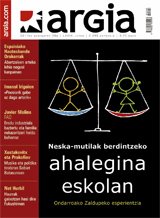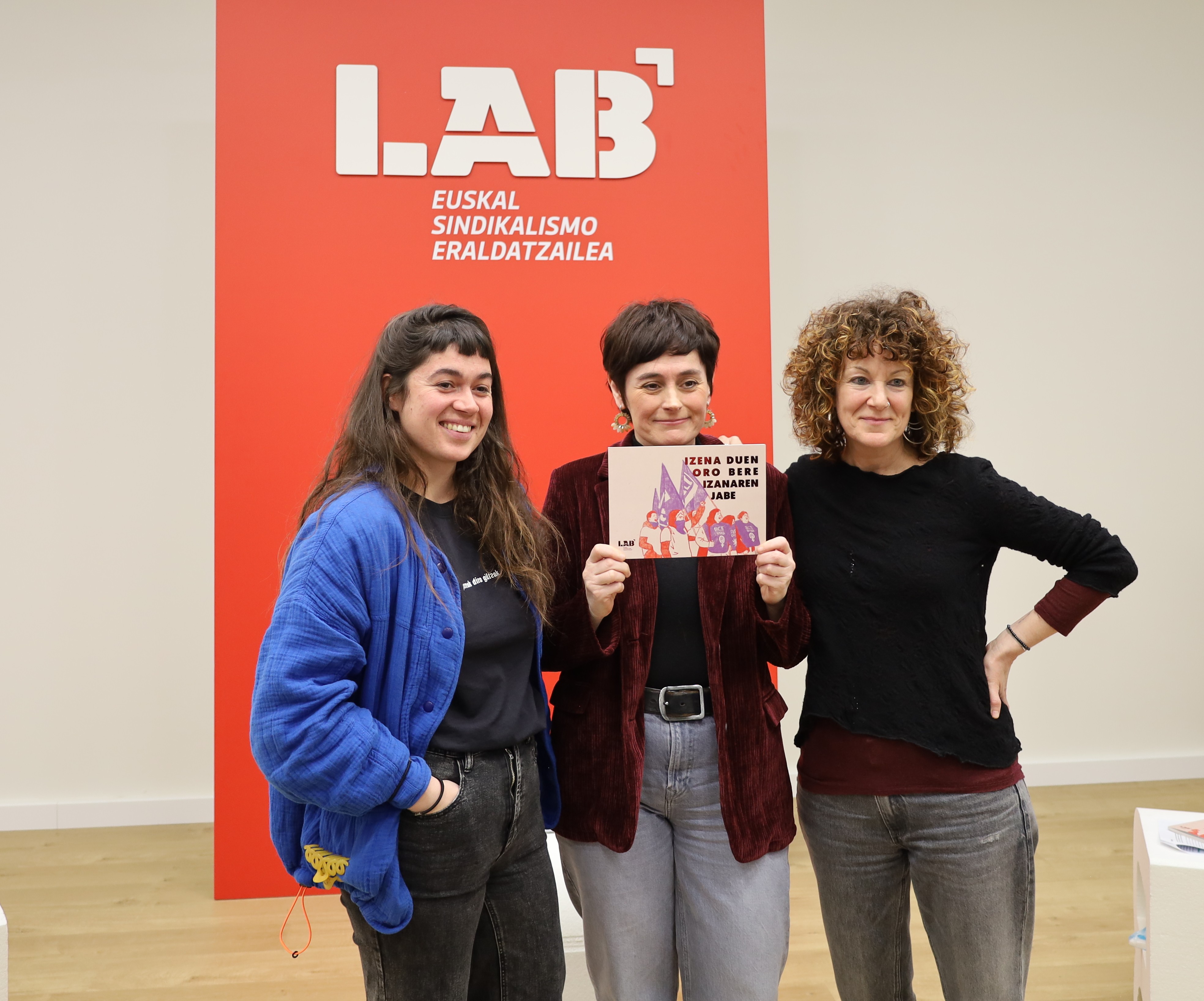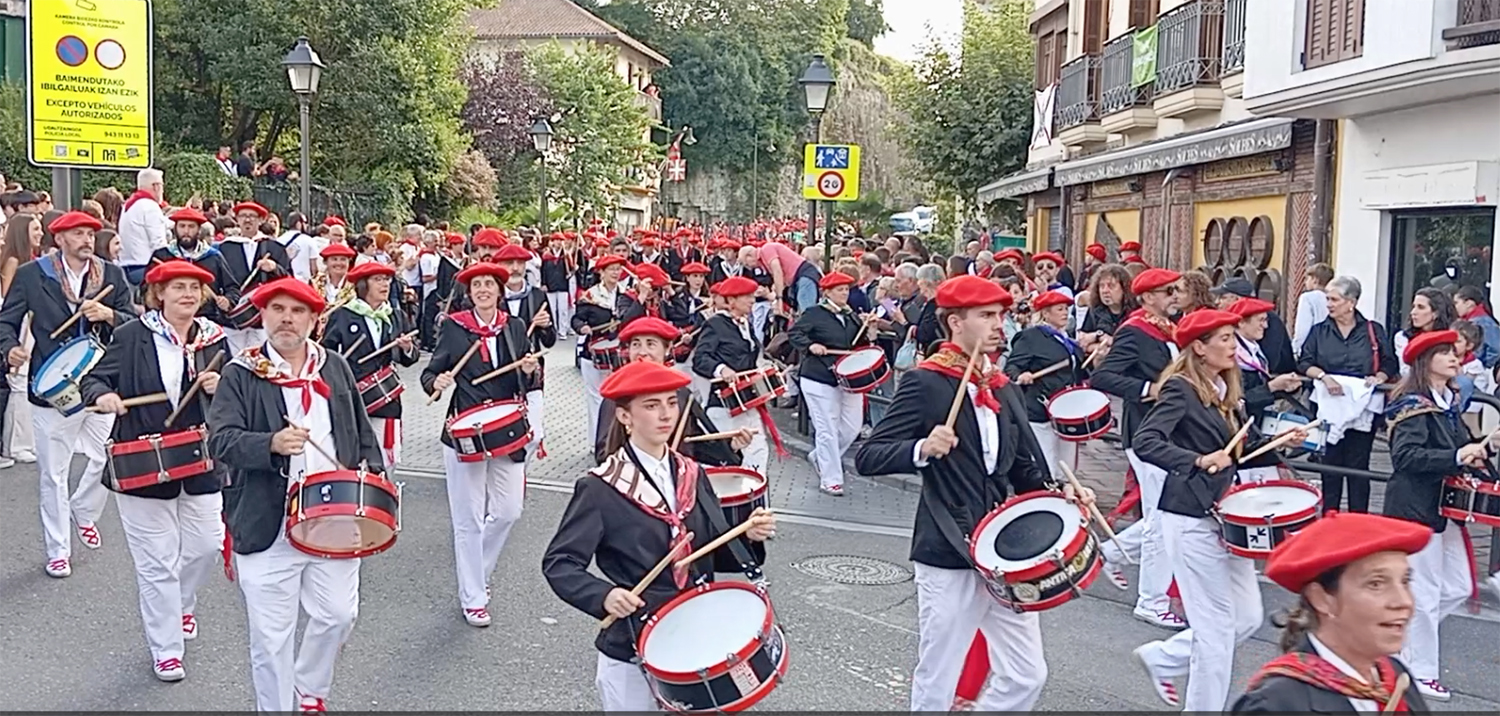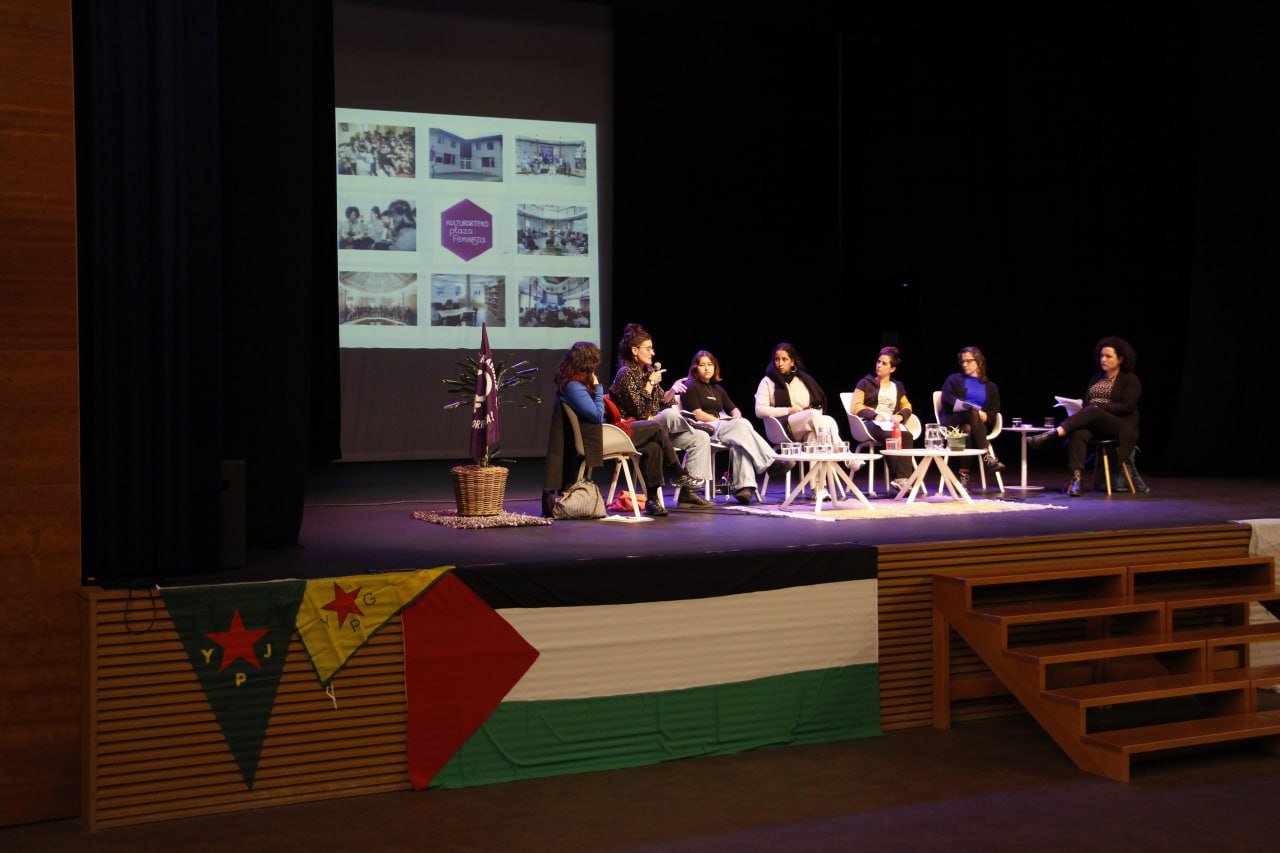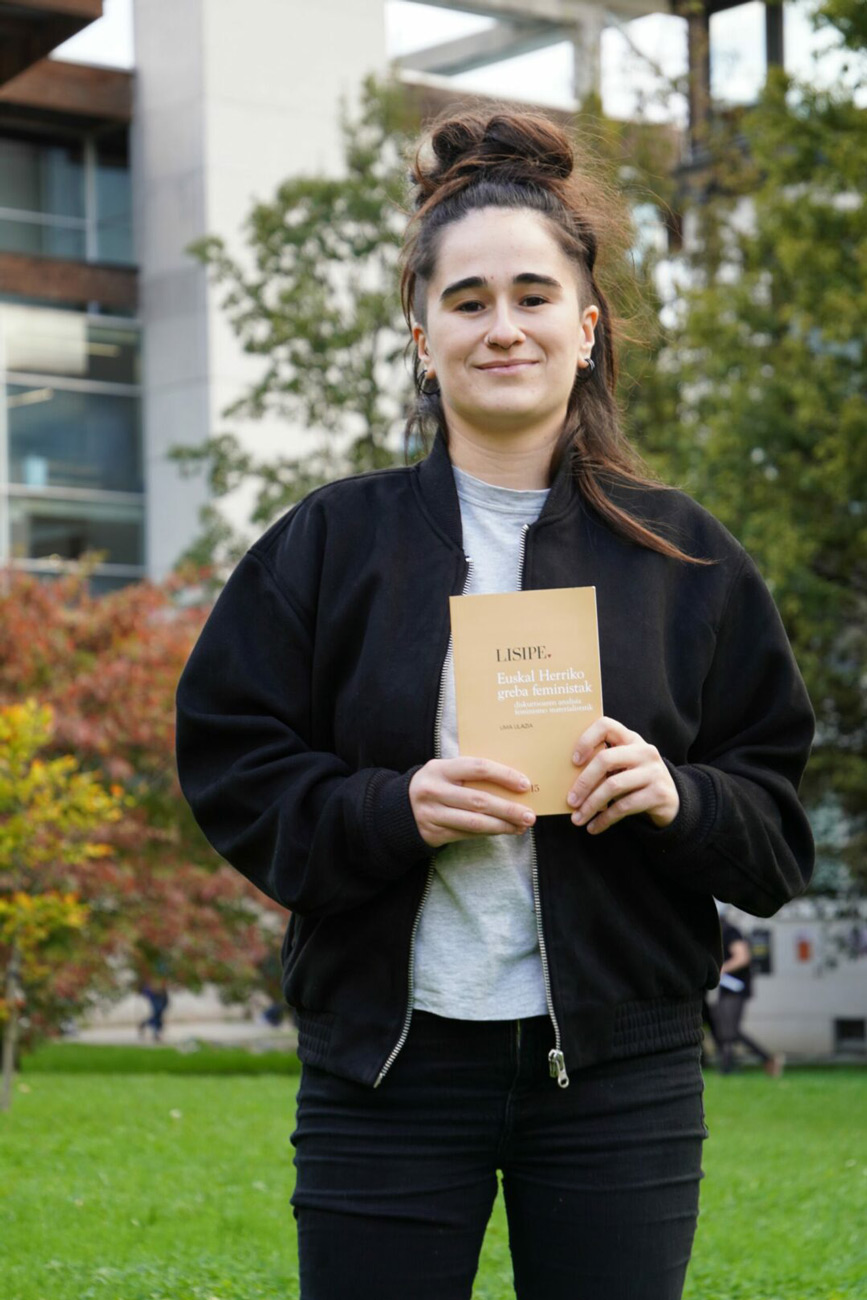Purple glasses at Zaldupe School
- November 25 is the International Day against Violence against Women. Male violence is the most visible indicator of inequalities between women and men. There are things to do before we get to those relationships. In 2009, in the CAV, 35% of the victims of violence by their partners or ex-partners were between 18 and 30 years old. We have come to school to learn how they manage gender inequality.
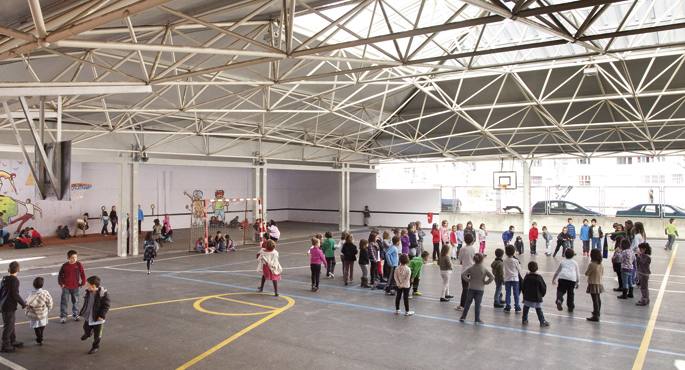
A conference on male violence. The journalist who wrote these lines went to a workshop on education, in which Arantxa Agirre participated. The members of the workshop have presented us. The side has done so: “I have experienced violence from my partner. Now I'm better, but I hope I don't know where I am now. I have two children and I've come to the education workshop because I'm worried about their future. They're both boys and I worry about how I'm going to educate them. They have also told me: Will we be like the father? I'm making an effort to educate on equality, but I think I'm against the wall. The school is not to the same extent, I would say it is going in the opposite direction. I'm afraid." The educational community is nothing more than a reflection of reality, reproduces the inequalities of everyday gender.
We went directly to a college to learn what they do to promote equality between boys and girls, and we landed at the Zaldupe Public School in Ondarroa (Bizkaia). They have many years of experience in co-education, starting on the road. They now have greater protection. The Equality Area of the City of Ondarroa coordinates all the schools of the town, is the third year that the co-educational program is launched. The Municipalities of Ondarroa and Markina-Xemein have made the diagnosis of perceptions and opinions of young people about sexist violence in Ondarroa and Markina-Xemein – available entirely on the website of the City Council of Ondarroa.
Let's go back to Zaldupe College. Around the discussion table were the director Mari Tere Kaltzakorta, the head of studies Gurutzne Anakabe and the educator of the Urtxintxa Leire Ercilla School and the educator of the Nahiko program that Emakunde has in the schools. The director of the centre has started talking about equality and has suddenly put football on the table. Zaldupe noted the first year that Emakunde extended the Nahiko program to schools, but by then he had already come a long way. Football was the starting point. At the end of the recess, it was common for the girls to complain to the teachers, that the boys did not let them play, that they were allowed to play, but that they did not have balls ... The tutors talked to the football boys about what was happening in the classroom and responded: “We don’t spend the ball because when the ball passes they protect themselves, they don’t touch, they don’t know how to play.” Kalakorta knows about the football battle: “We have been studying the use of the patio for many years and football has always been the star of the conflicts. It occupies a lot of space in the patio and creates problems. The moment the ball appears, violence appears, which is not controlled. They get obsessed with the ball, suddenly they become Llorente of Bilbao and I don't know what about the Real. We told them that the Real and Athletic games are not played at school, that everyone has to participate, but the kids have never understood it that way.” There's always some girl playing soccer with boys, but absolutely no girls and boys together. They do it because they know it's politically correct and the teachers look at it.
Hours of play without football
They have agreed with the students and have done so: on Tuesdays and Fridays at recess you cannot play with the ball. The distribution of uses of the patio has changed a lot, football barely occupies the patio and there are no classic divisions, that is, boys playing in the center and girls standing on the sides. They have managed to reach agreement with the students to two hours of play without football. On the road to equality, this is a test, but the difference is clear. Right now they are analyzing in depth the distribution of the use of the patio and will surely soon have new proposals on the table.
After years of fighting in football, with differences between boys and girls, in the course 2003-2004 a gap was made in the school to the Nahiko program of Emakunde. Today, they keep on with that. The project is made up of teachers, parents and pupils, but the director Kaltzakorta complained that from now on teachers will not receive direct training, that is to say they will have to pass on to the teachers what they have learned. We have asked them about the training of teachers in co-education and the three agree: they have a poor education, among other things because in the University School of Magisterium no subjects are taught about co-education or gender equality.
We have politically straight children.
Boys know that they have to let girls play with them at recess, even if they don't like it. Boys and girls know that any boy or girl, whether it's a boy or a girl, can play any sport, even if she then makes fun of the kid who does ballet. Educator Leire Ercilla develops a Co-Education Plan at Ondarroa Schools and has found that boys and girls are politically correct: “They sit in the circle, they start talking to them and they are very common from the point of view of equality. Also for 6 years. But when you stop talking, you have fun and you're ready to go down. ‘I never cry!’, the boy will say, for example.
Mari Tere, director of the Kaltzakorta College, told us a very remembered exercise: Children between the ages of 11 and 12 had to write on paper who did homework at home and how long it took to do each activity. Calcakorta was provocative and the children became chaotic with the exercise: “Do you have breakfast prepared, the mother has risen before you to prepare it? Why do you have prepared clothes? How has breakfast milk come to the refrigerator? Listen! But if you have served your parents all the hours of the day and have not had time to sleep! Let’s say now that your little brother has become ill and someone has to take care of him...” The exercise showed a lot of things, most of the household chores were done by the mother, but also more: “They didn’t realize the weight of household chores. How will you remember that almost everything is done by the mother if you don’t realize the terrible housework?” Yes, there was no difference between boys and girls who seemed less responsible.
Purple glasses are not for sale
The younger, the harder it is to detect gender inequalities, at least so does Ercilla: “The teachers of Early Childhood Education told me that at those ages the differences between boys and girls are not as obvious as they are later. It's true, but some Early Childhood Education teachers have a lot of resistance and they'll tell you. ‘We treat boys and girls alike.’ At these ages it is more difficult to detect inequalities, the roles are not so defined. Everyone has their fingernails painted for 2-3 years, and nothing happens. For 6 years, they are not painted or cut off.” The galley continued: “If you’re a child, yes, but you don’t imagine a 12-year-old with your fingernails painted and it doesn’t have to be that way.” Kaltzakorta, Ercilla and Anakabe agree that we are well taken on board the idea that we have achieved gender equality and that it is difficult for them to detect the differences between boys and girls. Leire Ercilla referred to the need to wear purple glasses and Kaltzakorta added that such colour glasses can only be obtained in some cases because they are not on sale in the shops because they are not fashionable. Working on gender equality in the middle is not teaching mathematics. We asked the three of the table: teachers who teach the educational units of equality must be aware of gender equality, right? Ercilla responds: “It’s a bad thing, because it forces you to study your daily life, you have to look at your life, because this issue is not a problem of school, of the family, of the street... It's everybody's. La Calcita gives us the example of the jersey: “It’s not a sweater that gets dressed and removed, you have to put it in the skin. You have to live with that, and it has no beginning or end. That’s why 8 March and 25 November are important days of reclaiming and we’ll do something special, but we know that these are specific days.”
Haur txikiak izanik ere, genero ikuspegitik "markatuta" al doaz gelara, alegia, neskek nesken rolak betetzen dituzte eta mutilek mutilenak?
Haur-eskolara 4 hilabeterekin joaten hasten den haurrak generoa oraindik ez du oso markatua edo ikasia. Baina jaiotzetik eta jaio aurretik ere, hasten gara ingurukoak haurrari neska edo mutil kategoria eman eta horren arabera, haiekin jarrera bat edo beste izaten, hau da, sexuaren araberako rolak proiektatzen. Mutiletaz mugituagoak, zakarragoak, astokiloagoak izatea espero da askotan; nesketaz ordea lasaiagoak, zintzoagoak, txukunagoak izatea. Aurreiritzi horiek eragin handia dute gure jarreretan eta beraz, haurrengan. Horri gainera, jendarte sexistak neska eta mutilentzako prestatuak dituen ipuin, jostailu eta abarrak gehituz gero, bada bai, haurrek rol sexistak dezente eta bizkor bereganatzen dituzte eta geletan nabaritzen da.
Igartzen al da zein etxetan duten jorratuagoa berdintasunaren gaia eta zeinetan jarraitzen duten eredu tradizionalagoa?
Gertatu zait 3 urteko gelaren batean mutil batek bere mantala ez eduki, tenpera egiteko nik beste haur baten mantala arrosa eskaini eta honek, koloreagatik soilik, jarri nahi ez izatea. 5 urteko gelan mutil batek Olentzerori margoak eta panpina eskatuko zizkiola esan eta askok barre egin zioten. “Nesken eta mutilen jolasak daude”, hala esan zidaten. Presio sozial handia dago, baina gurasoek garrantzi handia dute haurren hezkuntzan eta berdintasunean hezten badituzte halako gauzak gutxiagotan gertatuko dira eta rol estuetatik haragoko pertsonak garatu daitezke.
Irakasleak prestatuta eta kontzientziatuta al daude haurrak berdintasunean hezteko?
Hezkidetza irakasle askok entzuna izango duten gaia da, curriculumetan jasotzen dena, zenbait ikastaro eta tailerretan lantzen dena. Badu nolabaiteko oihartzuna… baina orokorrean beste helburu batzuk lehenesten dira eta hezkidetzari ez zaio behar besteko garrantzia ematen. Ez ditut irakasleak berdintasunarekiko oso kontzientziatuak ikusi, badirudi aspaldi lortu zen erronka zela eta dagoeneko oso ondo bizi garela. Are gehiago, askotan entzun ditut “mutil-mutila da”, “neskak sorginagoak dira” eta halako komentarioak.
Irakasle izan zaren tokietan zein programa, baliabide edo modu erabili dituzue berdintasuna lantzeko?
Haur Hezkuntzako ordezkapenak egiten nabilen 4. ikasturtea da hau eta oraingoz, ez dut ikusi hezkidetza programa edo baliabide zehatzen bidez lantzen denik. Lanketa irakasleen kontzientzia, iniziatiba eta denboraren araberakoa izan da. Orokorrean hausnarketarako eta planteamendu berriak egiteko tarte gutxi dago, eta batzuetan, sexistak diren elementuak aldatzeko proposamenekiko erresistentzia dago. Beste batzuetan, gauza gehiegi aldatu behar direla (esate baterako hainbat material pedagogikoren euskarriak, hala nola ipuinak eta abestien letrak) eta nondik hasi ere ez jakitearen sentsazioa eduki dut. Horretarako talde lana eta hausnarketa kolektiboa beharrezkoak dira.
Ikastetxeetan genero desberdintasunak hor dirau.
Agerikoa da. Baina eskolak ez dira mundutik apartekoak. Kalera bazoaz, aurpegian begiak baldin badituzu eta sentsibilitatea, ikusiko duzu desberdintasun nabarmenak daudela. Beraz, eskolak patxadaz eta lotsagabekeriaz erreproduzitzen ditu horiek.
Irakasleak eta gurasoak jabetzen al dira hortaz?
Ez. Hori da generoak daukan botere izugarria.
Orain, sikiera politikoki zuzenak gara. Zerbait aurreratuko genuen, ezta?
Asko. Franco hil zenetik, genero ikuspegitik, gizartea ikaragarri aldatu da. Baina berdintasunaz hitz egingo al dugu? Ez! Gizartean politikoki zuzenak garela? Eskolan ere bai. Gizartean ez garela konturatzen egiten dugunaz? Eskolan ere ez. Borondate txarrez egiten al dugu? Ez, ideologia kontuengatik egiten dugu. Alegia, nik uste dut munduak horrelakoa izan behar duela, beraz, horrela begiratzen dut eta horrela eraikitzen dut.
Ezkor ari zara…
Ez, ni ez naiz ezkorra. Hau dena ikusten baldin baduzu, aldatzeko gaitasuna baduzu.
Beraz, lana dago.
Ikusarazten. Ikusten hain errazak ez diren biolentziek kezkatzen naute. Adibidez, eskolan dira haurrak uniformearekin, neskak tolesturadun gonekin, mutilak tergalezko galtza oso politekin. Hor ez dago biolentziarik, ezta? Azter dezagun: atera da haurra jolastokira eta zuhaitzera igo da, zer gertatzen da batek gonatxoa badarama eta besteak galtzak? Bati kuleroak ikusten zaizkio eta besteari ez. Beraz, neskari esango diogu: “Ez igo, egon geldirik!”.
Berdintasuna, programa solteka baino, ikastetxe osoan zeharka landu beharreko gaia al da?
Generoa ez da transbertsala, oinarria da. Zera esan nahi dut: ezin ditut Haur Hezkuntzako politikak egin, badakizu zergatik? Ez dagoelako haurrik, neskatilak eta mutikoak dauzkagu. Beraz, politikak egin beharko ditugu markatuta dauden neskei marka hori kentzeko eta berdin mutilekin. Politika neutroak ezin ditut egin, ez daukat elementu neutrorik-eta. Hezkidetza tailerrak egitearen aurka nago. Adabakiak dira. Irakasleak behartzen dituzu kontsumo-osasun-bake-sexu hezkuntza egitera eta nekatuta daude irakurtzen eta idazten eta batuketak eta kenketak egiten irakasteko.
Nola egingo zenuke orduan?
Ikasgaiak patriarkatuaren betaurrekoak kenduta irakastearen alde nago. Ez naiz ari esaten genero ikuspegia daukaten betaurrekoak jantzi behar ditugunik, zeren errealitateak badauka generoa. Patriarkatuaren betaurrekoak kentzea da kontua eta ikusiko duguna ikaragarria izango da. Ikasgai askok genero zama transmititzen dute eta hori kentzen saiatu behar dugu.
Esate baterako...
Gorputz heziketa. Neskei ez zaie asko gustatzen. Noski, ikasgai oso maskulinoa da, dantza, koreografia, soka gutxi egiten da. Lehen Hezkuntzako 4. mailan hula hoopeko azterketa jarri dut, futbolaz azterketa egin dezakedan bezala. Mutilekin indarra, abiadura eta erresistentzia lotzen ditugu eta neskekin koordinazioa, malgutasuna eta abilezia. Kontua da ikasturtean zehar curriculum orekatua egitea, ikuspegi maskulinotik eraikita baitago. Beste adibide bat: historiak kontatzen digu nolako aldaketa izan duen gure gizarteak Erdi Arotik gaurdaino. Zergatik ez dugu galdetzen ea zenbateraino aldatu den 1401. urtean Pirinioetan bizi zen emakumearen bizimodua eta 1901. urtekoarena? Beldur naiz ez ote genukeen esan beharko Pirinioetako emakumeak berdin-berdin jarraitu zuela mendez mende. Aldaketa sozialak izan dira, baina batzuentzat. Ikasgaiak birpentsatu behar ditugu, patriarkalak dira.
Beraz, berdintasunetik urrun gabiltza.
Ikastetxeetan egindako guraso bileretan, gizonei batetik eta emakumeei bestetik, aulkitik altxatzeko eskatzen diet. Behin, 67 emakume eta gizon bakarra zeuden, eta esan nien: nork esan du berdintasuna lortu dugula? Zer gertatu da? Jendeak uste du berdintasunean bizi garela lege berak ditugulako. Gazteek berdintasunean sinesten dute, baina mundu matxistan hezita daudenez, matxismoa erreproduzitzen dute eta normala iruditzen zaie. Horrela, neskak putak bailiran jantzita doaz institutura eta mutilak matxiruloarena egiten dabiltza, arrakasta izateko modu bakarra delako. Adibidez, eskola porrota askoz maskulinoagoa da eta inori ez zaio axola, mutilak gaizki portatzea normaltzat hartzen delako. Mutilen eskola porrotak ez zaitu arduratzen, baina panpinarekin jolasteak bai? Zu arraroa zara! Bi mutil ostiaka aritzeak ez zaitu kezkatzen, baina elkar musukatzeak bai? Hor zerbait arraroa dago!
Istorioetan murgildu eta munduak eraikitzea gustuko du Iosune de Goñi García argazkilari, idazle eta itzultzaileak (Burlata, Nafarroa, 1993). Zaurietatik, gorputzetik eta minetik sortzen du askotan. Desgaitua eta gaixo kronikoa da, eta artea erabiltzen du... [+]
This wedge that the announcement on the radio Euskadi to replace the bathtub with a shower encourages the commencement of the works in the bathroom of the house. A simple work, a small investiture and a great change are announced. There has been a shift in toilet trends and a... [+]
Zalantza asko izan ditut, meloia ireki ala ez. Ausartuko naiz, zer demontre! Aspaldian buruan dudan gogoeta jarri nahi dut mahai gainean: ez da justua erditu den emakumearen eta beste gurasoaren baimen-iraupena bera izatea. Hobeto esanda, baimen-denbora bera izanda ere, ez... [+]









